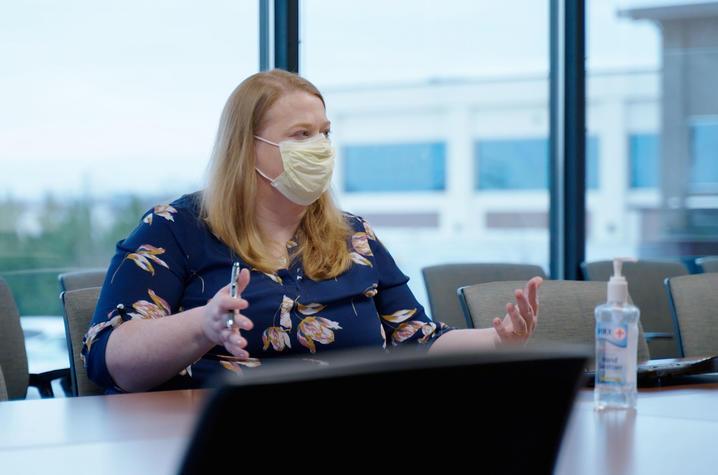Women Making History: UK researcher helps caregivers navigate Alzheimer's challenges

LEXINGTON, Ky. (March 1, 2023) — Throughout March, the University of Kentucky is spotlighting Women Making History during Women’s History Month. These women are leading their fields of research and impacting the lives of Kentuckians.
Their work addresses key issues impacting the Commonwealth, like cancer, Alzheimer’s disease and diabetes. They also offer new perspectives on history by finding ways to preserve our collective memory and better understand it.
For one researcher, her passion is helping some of the most vulnerable Kentuckians. Allison Gibson, Ph.D., is an associate professor in the College of Social Work and an affiliate faculty member at the UK Sanders-Brown Center on Aging. Her work focuses on helping people affected by Alzheimer’s disease and related dementias, both the diagnosed individual and their caregivers, through supportive programming.
“The population I’m probably most passionate about is people who live alone with Alzheimer’s. I think it’s an area that we, as health care professionals and social service providers, don't have a good handle on,” said Gibson. “You need to strike the balance of honoring their independence and supporting them living in their own home with ensuring they’re safe with their basic needs covered.”
Gibson has worked on a variety of programming options suited for different populations of patients needing different levels of care from developing educational resources and workbooks, to group-style intervention for people affected by a mild cognitive impairment (the early symptoms associated with Alzheimer’s), to telehealth interventions connecting people in rural Kentucky to occupational therapists.
Gibson’s latest project builds off an interdisciplinary collaboration between social work and music therapy to find ways to improve the well-being of older adults.
She and Alaine E. Reschke-Hernández, Ph.D., an assistant professor in music therapy at the School of Music in the UK College of Fine Arts, have been awarded the prestigious Arthur Flagler Fultz Research Award by the American Music Therapy Association to further this project.
During the pair’s pilot study, funded by the Igniting Research Collaborations program under the Office of the Vice President for Research, music therapy was offered to a group of older adults over eight weeks with the opportunity to connect with a social worker on the team at the end. Gibson and the team would identify areas where people were struggling, like in their health or social engagement, and then help them find continuing support within the community. She has also received pilot funding from the UK Center for Clinical and Translational Science.
“We had one gentleman who was having a hard time seeing over the course of the telehealth intervention. After getting to talk to him, we realized he needed glasses but didn’t have the financial resources, and we were able to find a clinic in his community that could help with those services,” said Gibson.
“That’s an example of how improving the health and well-being of an older adult in short-term minimal ways can have huge implications for that individual," she said. "With this new iteration of the intervention, we're really hoping to really test the combination of music therapy and social work services.”
Outside of her clinical and teaching spaces, Gibson is a new mother navigating the challenges of balancing high-intensive research with responsibilities at home.
“Other female scholars and clinicians have been incredibly helpful and supportive in this new chapter,” said Gibson. “My advice to other women in research: You should definitely have other women scholars, other women scientists in your life whom you can lean on for research and everyday life support.”
Gibson credits part of her journey in working with some of the most vulnerable Kentuckians to supportive female mentors.
“During my doctorate education program, a lot of people said not to pursue the ‘people living alone with Alzheimer’s’ population, saying ‘It’s too difficult, there are too many challenges.’ I had a wonderful mentor who told me, ‘We're going to figure it out. We’re social workers. That’s what we do. That’s part of the job is we navigate the mess.’”
In her time at UK, Gibson has been part of more than 20 funded research projects along with dozens of publications, all while guiding students through field practicums and supporting patients with thoughtful interventions.
“I will say it makes me proud to be a woman doing this type of work. Historically, Alzheimer’s and dementia work has been predominantly male. It’s also been very focused on pharmacological treatment, which, of course, is super important. We need ways to either slow this disease or prevent it,” said Gibson. “But it's also important that we have options for people who are currently affected by these types of diseases. That’s where I really feel like I'm offering something new and something that's important.”
Video Produced by UK Research Communications. To view captions for this video, push play and click on the CC icon in the bottom right-hand corner of the screen. If using a mobile device, click on the "thought bubble" in the same area.